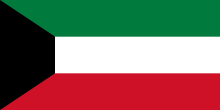The Kuwait Portal Kuwait, officially the State of Kuwait, is a country in West Asia. It is situated in the northern edge of Eastern Arabia at the tip of the Persian Gulf, bordering Iraq to the north and Saudi Arabia to the south. With a coastline of approximately 500 km (311 mi), Kuwait also shares a maritime border with Iran. Most of the country's population reside in the urban agglomeration of Kuwait City, the capital and largest city. , Kuwait has a population of 4.82 million, of which 1.53 million are Kuwaiti citizens while the remaining 3.29 million are foreign nationals from over 100 countries. Historically, most of present-day Kuwait was part of ancient Mesopotamia. Before the discovery of oil reserves in 1938, the country was a regional trade port; from 1946 to 1982, the country underwent large-scale modernization, largely based on income from oil production. In the 1980s, Kuwait experienced a period of geopolitical instability and an economic crisis following the stock market crash. In 1990, Kuwait was invaded and subsequently annexed by Iraq under the leadership of Saddam Hussein following disputes over oil production. The Iraqi occupation of Kuwait ended on 26 February 1991, following military intervention by a coalition led by the United States and several other nations. Like most other Arab states in the Persian Gulf, Kuwait is an emirate; the emir is the head of state and the ruling Al Sabah family dominates the country's political system. Kuwait's official state religion is Islam, specifically the Maliki school of Sunni Islam. Kuwait is a high-income economy, backed by the world's sixth largest oil reserves. Kuwaiti popular culture, in the form of theatre, radio, music, and television soap opera, is exported to neighboring Gulf Cooperation Council (GCC) states. Kuwait is a founding member of the GCC and is also a member of the UN, AL, OPEC and the OIC. (Full article...) Selected article -Sheikh Mubarak Al-Sabah KCSI KCIE (c. 1837 – 28 November 1915) (Arabic: الشيخ مبارك بن صباح الصباح) "the Great" (Arabic: مبارك الكبير), nicknamed "The lion of the peninsula" (Arabic: أسد الجزيرة), was the seventh ruler of the Sheikhdom of Kuwait, from 18 May 1896 until his death on 18 November 1915. Mubarak ascended the throne upon killing his half-brother, Muhammad Al-Sabah. Known for his significant role in shaping modern Kuwait, the constitution of the State of Kuwait mandates that the Emir of Kuwait must be a descendant of Mubarak from the ruling Al-Sabah family. Mubarak was the seventh ruler of the Al-Sabah dynasty. Mubarak was also the father of two rulers of Kuwait who succeeded him, Jaber and Salim, from which the Al-Jaber and Al-Salim in the Al-Sabah family branches originated respectively, and is the paternal ancestor of all successive rulers and prime ministers of Kuwait. (Full article...)Did you know...
Related portalsReligions in Kuwait Arab states Other countries TopicsWikiProjectsAssociated WikimediaThe following Wikimedia Foundation sister projects provide more on this subject:
Discover Wikipedia using portals |








































